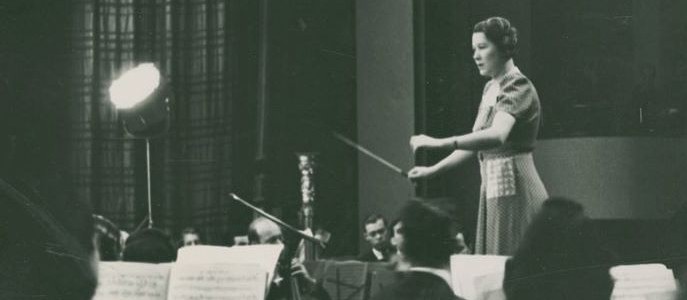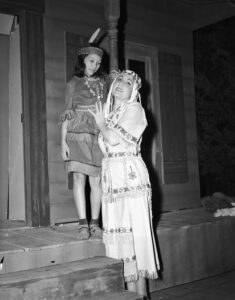We continue our series, Composers to Discover! featuring essays by students in the Public Musicology Certificate Program at Columbus State University. Today’s essay is by Madison Witzke, a Columbus-(GA)-born and raised native attending the Schwob School of Music. She is a music education major, is working towards a Public Musicology Certificate, and plays clarinet.
Julia Smith, born January 25th, 1905 in Caldwell, Texas, was a composer, pianist, conductor, author, and musicologist. Interestingly enough, she got her bachelor’s degree in English, although she was involved in music and even composed the school song (University of North Texas’ alma mater, “Glory to the Green,” which rings out from the clock tower every day at noon). She continued her education at New York University and The Juilliard School of Music where she studied piano, composition, and orchestration. Years later, she obtained her doctoral degree in which she was one of the first people to write about Aaron Copland in her dissertation (published as a book in 1955).

Julia Smith as a guest conductor with the Dallas Symphony Orchestra, in 1940.
Smith was an avid supporter of the representation of women in music. In an interview with Bruce Duffie, Smith told him that when she got married to her husband, they never had children because she wanted to focus on her career and so did he. Smith stated that they both agreed “to take steps not to replenish the population. We both felt there were enough people busy at that, and the world didn’t need our help in that way.” Adding onto this story, Smith said one time she told a group of girl scouts that she wrote seven operas instead of having seven children like her mother did. Smith said, “I planted a little seed of thinking about something besides getting married and having your children and being a housewife forever.” And she could see the hope in these kids’ eyes.
About Smith writing seven operas, one of these operas in particular has drawn more attention. “Cynthia Parker” was her first opera and premiered February 16 – 17, 1939 at North Texas State Teachers College (now North Texas State University) in Denton. “Cynthia Parker” is a Texas-themed opera that Smith wanted to be performed as a part of the Texas Centennial Celebrations in 1936, yet the opera was not completed by that date. The opera is based on a real story that is quite tragic. In 1836, Cynthia Parker was a 9-year-old girl who was kidnapped from her family by the Comanche Tribe. During the years that Cynthia spent with Comanches, she became accustomed to their lifestyle and married a Comanches Warrior named Peta Nocona. Cynthia had two sons and one daughter, Prairie Flower, with Peta Nocona before the Texas Rangers raided the Comanches camp and captured Cynthia and her infant daughter in 1860. The legend goes that Cynthia was not killed by the Texas Rangers because her blue eyes told the story of her ancestry. Unfortunately, her infant daughter did not survive long after the capture and Cynthia was returned to her original family but she never got accustomed to living back in that lifestyle. Cynthia never saw her sons again (her husband was killed in the Rangers’ raid) and she died ten years later in the year 1870. In the meantime, one of her sons, Quanah, became a respected warrior and chief before she died.

Metropolitan Opera soprano Leonora Corona as the title role. North Texas State Teachers College stage production, Feb. 15, 1939. University of Texas at Arlington Libraries, Special Collections
The opera Smith created on this true story had some similarities yet some differences at the same time. Smith changes the date of Cynthia and her daughter getting captured by the Texas Rangers from 1860 to 1850 and her daughter is not an infant yet a young girl in the opera. At the end of the opera, Cynthia’s son, Quanah rescues her and Prairie Flower, but Cynthia is shot by an arrow and dies. Her death is preceded by a homestead “Ritual Death Dance and Procession” to conclude the work.
This opera was the one opera Smith could never leave alone – she always found herself returning back to it. In the same interview with Duffie, Smith said that she continued visiting this opera “because the story is so marvelous that I felt I wanted to leave that in good shape even if none of the others were.” After its premiere in 1939, this opera was not done again until the year 1985 for the Texas Sesquicentennial celebration, and this version included all three revised acts instead of just one act.
When Julia Smith died in 1989, she was planning to travel to Texas for the performance of her opera “Cockcrow.” Most of her music is still awaiting rediscovery.
Learn more about Julia Smith in this article from the Texas State Historical Association and in this article from the NT University Libraries 125 Year Archival Retrospective
Her Piano Concerto of 1938 is full or romantic lyricism and also jazzy energy. This rare recording is by a community orchestra.
Here her Cornwall Trio bursts with drive and humor. “The title refers to Cornwall-on-the-Hudson, New York, where Smith heard the bird calls which provide the thematic material for the first movement.”
